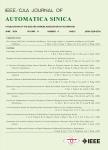Exponential Continuous Non-Parametric Neural Identifier With Predefined Convergence Velocity
Exponential Continuous Non-Parametric Neural Identifier With Predefined Convergence Velocity作者机构:Instituto Politécnico NacionalCentro de Innovación y Desarrollo Tecnológico en Cómputo Unidad Profesional Interdisciplinaria de Biotecnología07340Mexico CityMexico Tecnológico de MonterreySchool of Engineering and SciencesZapopanJalisco 45138Mexico Department of BioprocessesUPIBIInstituto Politécnico Nacional07340Mexico City
出 版 物:《IEEE/CAA Journal of Automatica Sinica》 (自动化学报(英文版))
年 卷 期:2022年第9卷第6期
页 面:1049-1060页
核心收录:
学科分类:0711[理学-系统科学] 07[理学] 08[工学] 081104[工学-模式识别与智能系统] 0811[工学-控制科学与工程] 0701[理学-数学]
基 金:supported by the National Polytechnic Institute(SIP-20221151 SIP-20220916)。
主 题:Exponential Lyapunov functions learning laws non-parametric identifier predefined convergence rate
摘 要:This paper addresses the design of an exponential function-based learning law for artificial neural networks(ANNs)with continuous dynamics.The ANN structure is used to obtain a non-parametric model of systems with uncertainties,which are described by a set of nonlinear ordinary differential equations.Two novel adaptive algorithms with predefined exponential convergence rate adjust the weights of the ANN.The first algorithm includes an adaptive gain depending on the identification error which accelerated the convergence of the weights and promotes a faster convergence between the states of the uncertain system and the trajectories of the neural identifier.The second approach uses a time-dependent sigmoidal gain that forces the convergence of the identification error to an invariant set characterized by an ellipsoid.The generalized volume of this ellipsoid depends on the upper bounds of uncertainties,perturbations and modeling errors.The application of the invariant ellipsoid method yields to obtain an algorithm to reduce the volume of the convergence region for the identification error.Both adaptive algorithms are derived from the application of a non-standard exponential dependent function and an associated controlled Lyapunov function.Numerical examples demonstrate the improvements enforced by the algorithms introduced in this study by comparing the convergence settings concerning classical schemes with non-exponential continuous learning methods.The proposed identifiers overcome the results of the classical identifier achieving a faster convergence to an invariant set of smaller dimensions.



